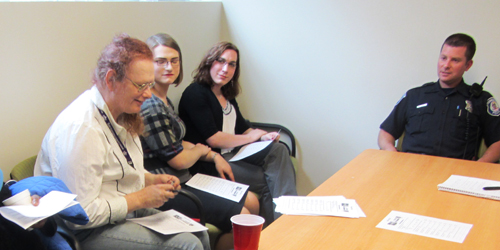By Crystal Proxmire

Citing a history of violence against transgender people in the prison system, the Los Angeles Police Department has announced plans for a 24-bed holding facility for transgender detainees in their women's facility. It is the first of its kind in the nation according to The LA Times.
This story was quick on the minds of the women who met with a member of the Ferndale Police Department as part of Transgender Day of Empowerment on April 14.
"What does Ferndale do when they arrest a transgender person?" asked one of the workshop's attendees.
That particular attendee shared a bad experience she had in another Southeast Michigan city. She had just gotten out of a public pool, wearing a swimsuit, shorts and a pair of flip flops, when she got into an argument with a visitor. Police arrested her, and booked her as a male because she had not yet completed the steps required to change the gender marker on her license.
"They put me in a cell with a bunch of guys. I had guys looking at me and licking their lips," she said. The police hadn't allowed her to put on clothes and instead sent her into a jail cell full of potentially violent prisoners. "A female cop brought me a blanket and then moved me into my own cell. She was the only one who did anything."
Officer Jason Colette has been with the Ferndale Police Department for twelve years and, though he has never arrested a transgender person, he has some experience with the community and knows that his job is to respect members of the public. The FPD sent Colette to participate in Transgender Day of Empowerment so that the transgender community could pose questions about law enforcement to an officer that they could trust. The meet also gave Officer Colette a chance to interact with more transgender people than he'd ever talked to in his life.
"I've never arrested a transgender person, but there are a few that we interact with who sometimes stay at the Motorama," he said. "If we did arrest a transgender person, we would put them in the individual cell that is away from the others. That would be the most logical thing to do."
Ferndale is known for its anti-discrimination polices and welcoming nature. Home to the Affirmations Community Center, Transgender Michigan, Michigan AIDS Coalition, and many LGBT-owned and friendly businesses, it has earned the nicknames San Fran-Ferndale and Fabulous Ferndale. In 2004 the Ferndale Police teamed up with Friends and Neighbors of Ferndale, a now-disbanded gay community group, to hold diversity training for the police force. Colette said officers are frequently doing various trainings and it's hard to remember if he did one on transgender issues or not, though there is a clear expectation of professionalism on the job.
The transgender women who attended the event discussed different situations with the officer, including how he might handle a bathroom complaint, or how he might respond to someone pulled over wearing women's clothing but with a male name and gender marker on their license.
"If someone is in a restaurant and they are asked to leave because of a dispute over which bathroom they use, we don't really get involved because they have a right to refuse service to whomever they want and it's not a criminal issue," Colette said. He also explained that if he pulled over someone, he would most likely look at the license's gender marker, but that if they were presenting as female, he would use female pronouns.
Like many people unfamiliar with the transgender community, Officer Colette sometimes stumbled on which pronouns were the right ones to use, unintentionally demonstrating that even well-intentioned people can get their terminology confused.
Police officers are confronted more and more with situations involving transgender people, though they often have never been trained the most culturally-sensitive ways to react. "Most officers are just trying to figure out what's going on, they don't set out to offend anybody," Officer Colette said. "If you're nice and respectful to us, in general we will be too."
One woman suggested that carrying a "carry letter" from a doctor explaining the individual's transgender status to bridge the communications gap when being questioned by the police.
"I always carry my name change letter," one of the women said. "When I got [in St. Clair Shores] pulled over it was like every nightmare story rolled into one. I couldn't find my license and I hadn't paid my car insurance. All I had on me was my letter. … The officer was really nice about everything. He told me to step out of the car so they could record my face for the camera [which is standard procedure for people pulled over who forgot their license, just in case the person is lying about who they say they are], and that I wasn't in trouble. I was 'mam'd and 'miss'ed and told to have a good day."
Someone pointed out there are many times when people are treated with respect, and commended the FPD for having good relationships in the gay and transgender community, and for sending an officer to speak at the event.
Transgender Detroit founder Michelle Fox-Phillips said she hopes that the Ferndale Police and other law enforcement agencies will allow Transgender Detroit to come in and talk with them about how to best relate to transgender individuals.
For more information about Transgender Detroit, go to http://www.Transgenderdetroit.org.










